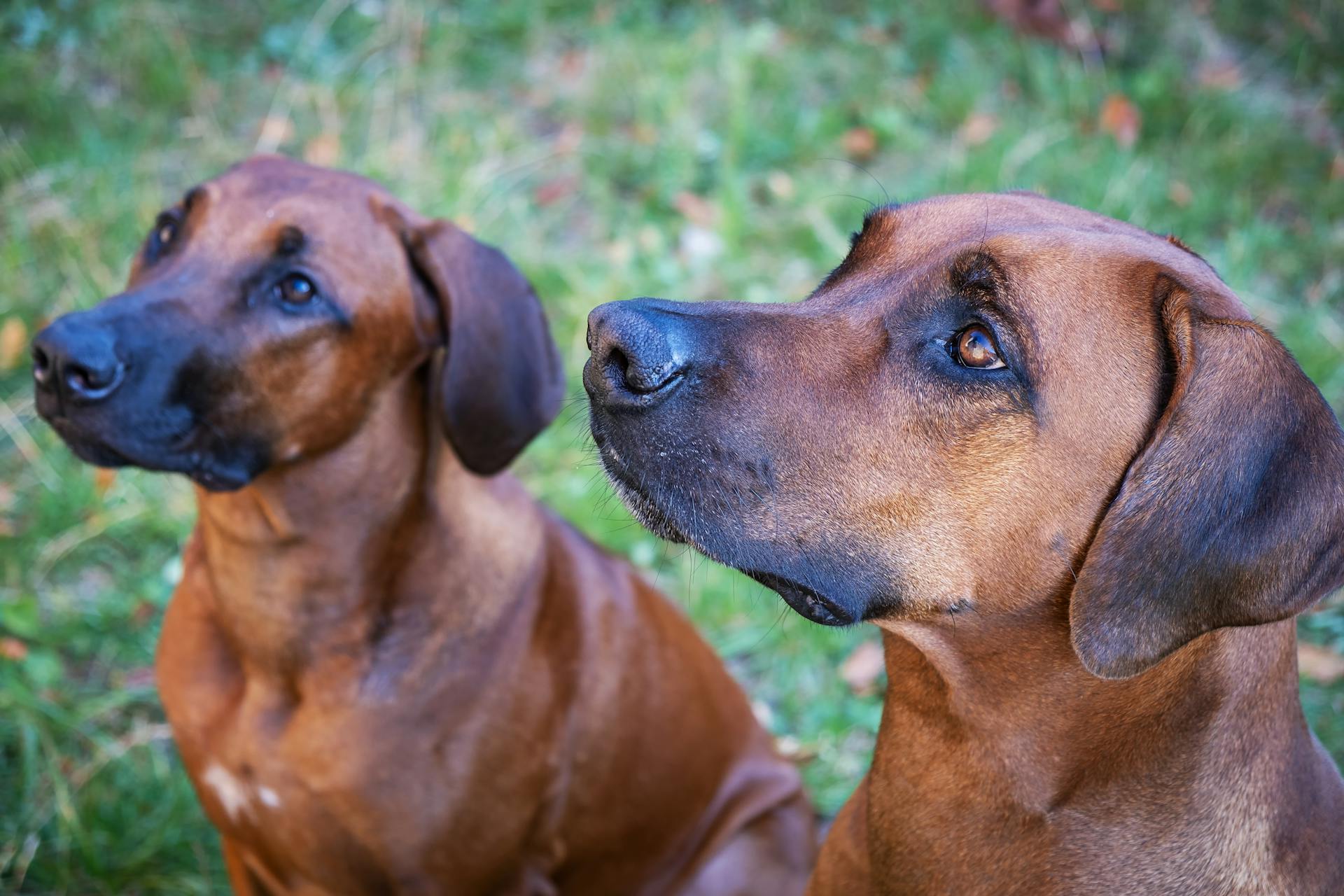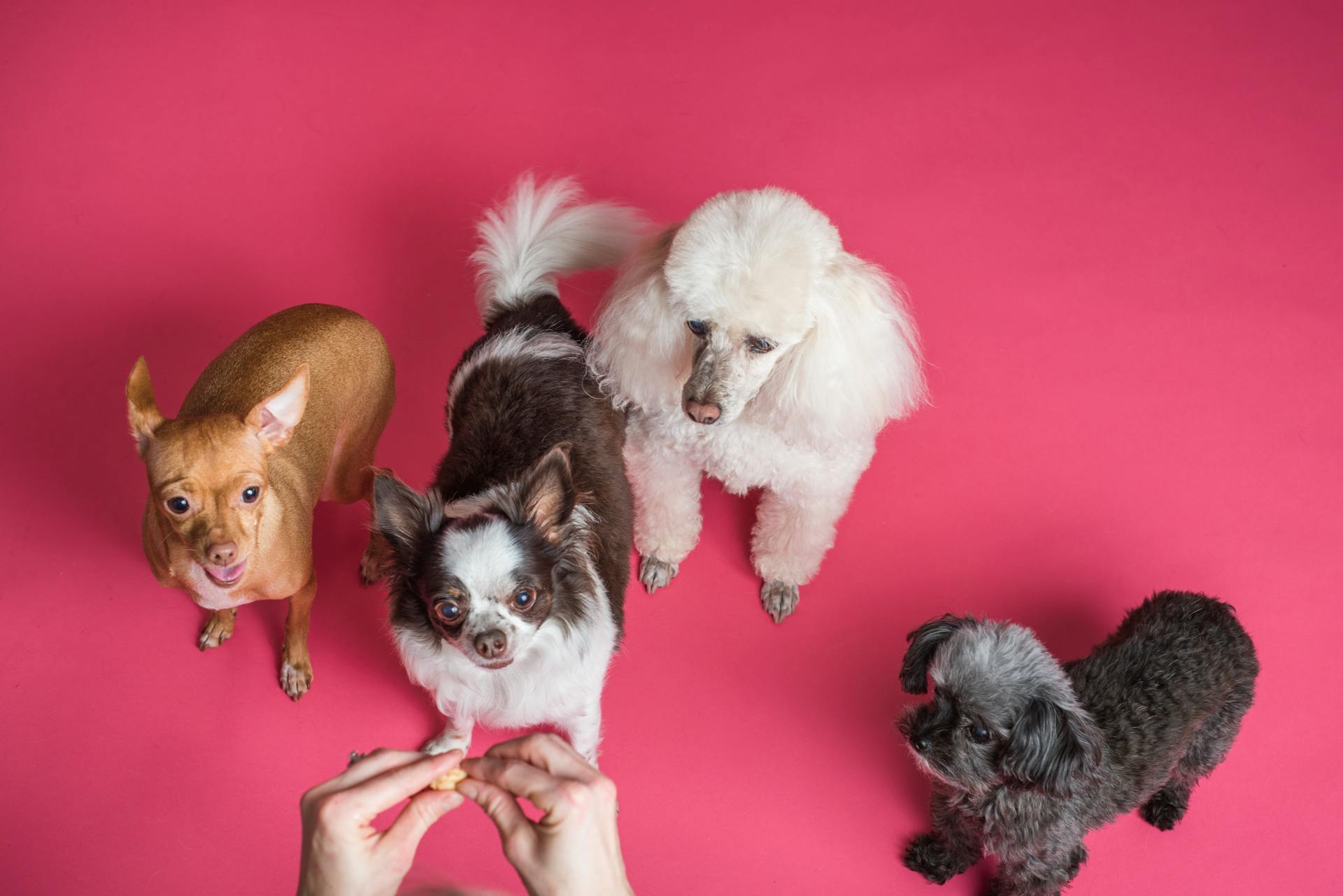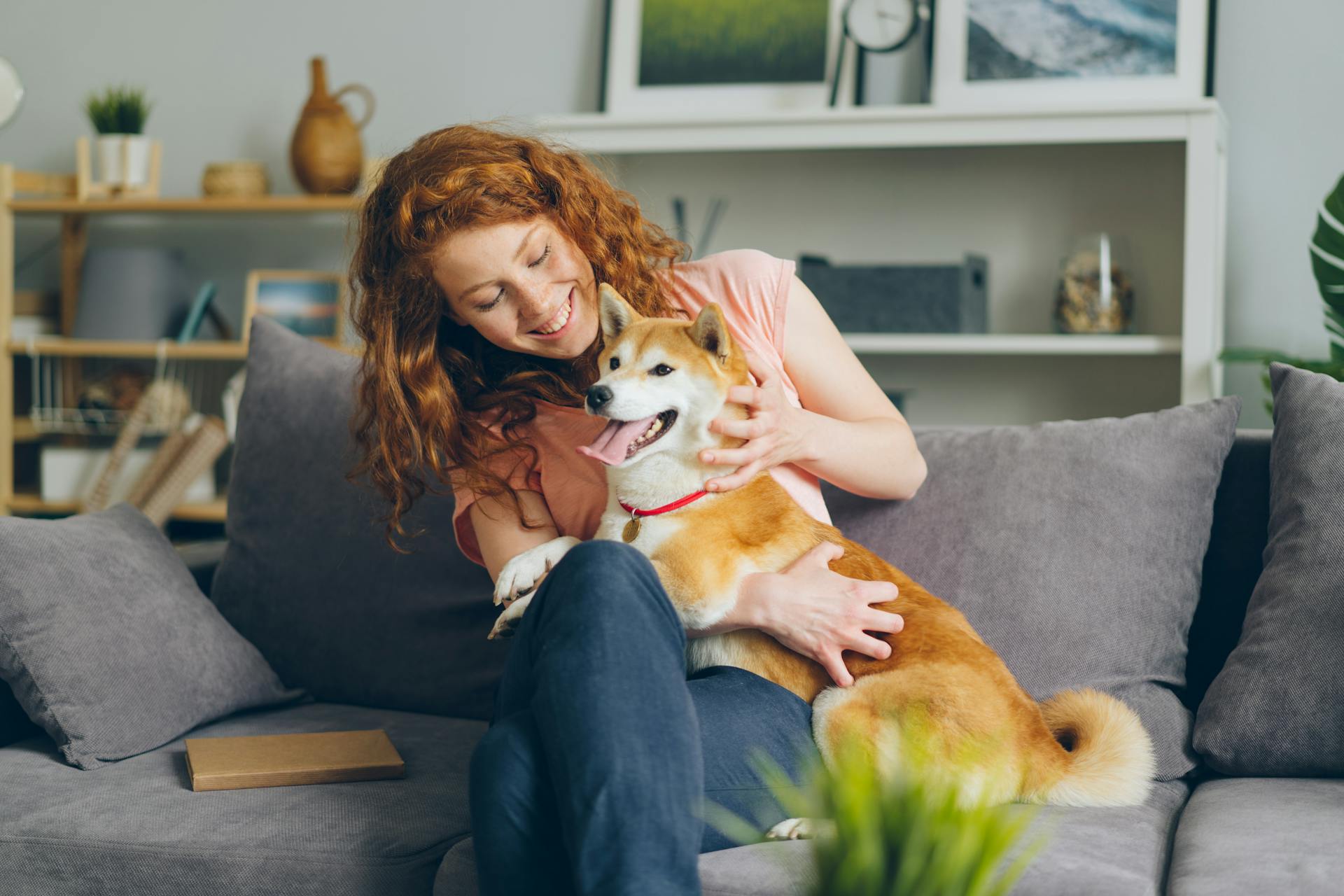
Dog daycare can be a great option for some dogs, but it's essential to understand their unique needs and behavior.
Dogs thrive on social interaction, and daycare provides them with a chance to meet new friends and engage in play.
However, not all dogs are suited for daycare. Some may be too anxious or fearful to handle the noise and chaos.
According to studies, dogs that are under six months old or have behavioral issues may not be a good fit for daycare.
Benefits and Features
Dog daycare can provide a safe and stimulating environment for your furry friend. Some facilities offer physical activity, exercise, and stimulation, especially important for young, high-energy dogs.
Dogs that attend daycare can help curb behavioral problems such as chewing, digging, and jumping. This is because they receive regular exercise and mental stimulation, which can reduce destructive behavior.
In addition to physical exercise, daycare can also help build confidence in timid or fearful dogs. With proper socialization and training, many dogs can become more confident and calm in the presence of other dogs.
You might enjoy: Shiba Inu Exercise Needs
Daycare facilities often provide a variety of play groups to ensure increased safety and quality of playtime. This is especially important for dogs that may not get along with other dogs.
Here are some benefits of dog daycare:
- Socialization with other dogs
- Supervised playtime
- Mental stimulation
- Reduced boredom
Some daycare facilities also offer training classes and safe environments with the help of professional dog daycare providers. This can be especially beneficial for dogs that require extra attention or training.
Overall, dog daycare can provide a fun and engaging experience for your dog, while also helping to reduce behavioral problems and build confidence.
Choosing the Right Facility
Convenience is key when selecting a dog daycare facility, so consider one that's easily accessible for drop-off and pick-up.
The size of the facility matters, as does the availability of amenities that will keep your dog engaged and happy.
Not every dog daycare is the same, so it's essential to vet the facility before committing to anything.
You wouldn't leave your human child at a new daycare without seeing the facilities, so it's not a good idea to do it with your dog.
Any reputable dog daycare will be willing to provide a tour of the facilities, giving you a chance to vouch for the cleanliness, size, and quality of equipment.
Leaving your pet with someone who is trained to understand animal behavior and/or is certified in pet first aid will ease your mind.
Intriguing read: Will Shiba Inu Hit 1 Cent
Dog Behavior and Needs
Dogs need stimulation to prevent boredom and destructive behaviors. The average dog spends 10+ hours alone every day, which can lead to weight issues, mobility issues, and destructive boredom behaviors.
Some dogs will sleep all day if left alone, but this sedentary lifestyle isn't healthy long-term. Dogs are social animals and thrive on interaction.
Dogs can get frustrated and depressed from spending too much time alone, just like extroverted people do. This can lead to unhealthy habits and separation anxiety.
A unique perspective: Can Goldendoodles Be Left Alone
Daycare for dogs is a great option to keep your pet busy and prevent undesired behaviors resulting from boredom or loneliness. Trained staff members maintain a watchful eye on interactions, ensuring play remains positive and boundaries are respected.
If you have a dog that suffers from separation anxiety, dog daycare can provide an outlet and social environment to alleviate their loneliness. Even weekly social interaction can help provide your dog with the activity and structure they crave.
The key is to find ways to provide activities for your dog on a regular basis, even when you're away. This can be achieved through daycare or other forms of socialization, such as dog training or dog parks.
Communication with Staff
Communication with staff is key to a successful dog daycare experience. Providing relevant information about your dog's behavior, preferences, and any medical conditions before the first day is essential.
Regular updates from the staff about your dog's progress help build trust. You'll want to ask questions and seek clarification if you have any concerns.
Open avenues for addressing concerns or sharing feedback ensure that your dog's needs are met optimally. This helps the staff tailor their care to your dog's unique needs.
Related reading: Why Are My Dog's Nails Splitting?
Separation Anxiety and Routine
Dogs with separation anxiety can feel anxious about being left alone, and it's hard on both of you. They may spend their day crying, howling, licking, chewing, or stressed out and anxious.
Dog daycare can provide a social environment and outlet for your dog, allowing you to go to work or school without leaving them alone. Weekly social interaction, especially in group set-ups, can help provide your dog with activity and structure.
Having a consistent routine is essential for dogs, and daycare can facilitate structure throughout the day that's more consistent with their preferred routines at home. This includes feeding times, playtime, bathroom breaks, and naps.
Frequent bathroom breaks and regular feeding times can improve digestion and urinary tract health, as well as aid in weight management and calorie distribution. The daycare staff can break up playtime and activities into more manageable chunks of time to prevent over-exertion.
If your dog has limited mobility, is a senior pet, or a puppy, daycare can help them pace themselves and avoid overdoing it. Ask your daycare what kind of activities your dog most enjoys participating in, and try to replicate them at home during one-on-one playtime to strengthen your bond.
Here's an interesting read: Can Bichon Frise Be Left Alone
Finding the Right Daycare
Finding the right daycare for your dog is crucial for their happiness and well-being.
Consider the location's convenience, allowing you to drop off and pick up your dog with ease. The size of the facility and available amenities play a significant role in determining the quality of your dog's stay.
Look for a facility with well-trained and experienced staff who will be responsible for your dog's daily activities and interactions. A social evaluation that helps ensure a good "fit" with the other campers is also essential.
At a good daycare, your dog will receive breaks for meals and naps according to their individual needs, and plenty of time to play with their furry friends in a group-play environment. They'll also get regular walks and exercise, which is especially important for young, high-energy dogs.
Some daycare facilities offer a variety of play groups for increased safety and quality of playtime. They may also have playrooms staffed by trained and experienced pet care technicians.
Additional reading: Dog Play Daycare
Here are some activities you might find at a daycare facility:
- Central Bark Walk: A 30-min walk in a park or waterfront area, one-on-one with your pup and their favorite counselor.
- Fetch Session: Your pup can choose any ball or plushie from the toy chest and play fetch with a counselor.
- Cuddle Time: Give your pup time away from the hustle and bustle of the room, with cozy bedding and a counselor to cuddle.
- Brain Games: Engaging puzzles and snuffle mats to challenge your pup's mind.
- Camp Craft: One-on-one time with a counselor, and a beautiful masterpiece painted by your pup's paws.
Frequently Asked Questions
Dogs can develop separation anxiety if left alone for too long, but dog daycare can help alleviate this issue by providing social interaction and exercise.
Is dog daycare good for puppies? The answer is yes, but it's essential to choose a daycare that's specifically designed for puppies, as they require more attention and care.
Some dog daycares offer separate areas for small and large dogs, which can help prevent conflicts and ensure everyone has a safe and enjoyable experience.
What about the risk of disease transmission? Dog daycares can take steps to minimize this risk, such as requiring up-to-date vaccinations and regular cleaning and disinfecting of facilities.
Can dog daycare really help with behavioral problems? Yes, it can, by providing a structured environment and socialization opportunities that can help address issues like barking, chewing, and digging.
Dog daycares can also help with exercise and physical activity, which is essential for maintaining a healthy weight and overall well-being.
Some dog owners worry about the cost of dog daycare, but the benefits can far outweigh the expenses, especially for dogs that require regular exercise and socialization.
What about the staff at dog daycares? Look for facilities with experienced and certified staff who can provide individualized attention and care to each dog.
Is Dog Daycare Good for My Dog?
Dog daycares provide a social environment that allows dogs to interact with other dogs and people, which can be especially beneficial for dogs that enjoy this type of interaction.
Dogs that attend dog daycares often receive mental stimulation and physical exercise, which are essential for their overall well-being.
A dog's socialization is crucial for their development, and dog daycares offer a great opportunity for dogs to interact with other dogs and people, helping to build their confidence and social skills.
You might enjoy: Hearing Dogs for Deaf People
By providing a safe and controlled environment, dog daycares can help to reduce stress and anxiety in dogs, creating a positive experience for them.
Dog daycares can be a great option for working owners who need to leave their dogs during the day, as they provide a fun and engaging place for dogs to spend their time while their owners are away.
Here's an interesting read: Shiba Inu Owner
Daycare Structure and Organization
Doggy daycare facilities have structured schedules that include playtime, rest periods, and sometimes training sessions. Dogs are typically grouped based on size, temperament, and play style to ensure safety.
Dogs are grouped based on size to prevent smaller dogs from getting hurt by larger ones. This helps create a safe and enjoyable environment for all dogs.
Rest periods are an essential part of a dog's day at daycare, allowing them to recharge and prevent overstimulation. These periods are carefully planned to ensure dogs get the rest they need.
Training sessions can be a valuable addition to a dog's daycare experience, helping them learn new skills and behaviors. These sessions are usually tailored to the individual dog's needs and abilities.
Broaden your view: What Does It Mean When Dogs Wag Their Tail
Frequently Asked Questions
Do dogs really like doggy daycare?
Dogs have varying preferences for doggy daycare, with some thriving in social environments and others preferring solo time
What age is best for dog daycare?
Typically, dogs can start attending dog daycare at 16 weeks old, after completing their vaccinations. However, the ideal age may vary depending on individual factors such as breed, size, and temperament
Sources
- https://www.nycampcanine.com/dog-daycare/
- https://www.theguardian.com/lifeandstyle/2021/jun/12/dog-daycare-who-will-care-for-your-pet-when-you-go-in-to-work
- https://www.k9resorts.com/doggie-daycare/daycare-faqs/
- https://www.pawsplaycle.com/is-doggy-daycare-good-for-small-dogs/
- https://blog.homesalive.ca/dog-blog/benefits-of-dog-daycare
Featured Images: pexels.com


